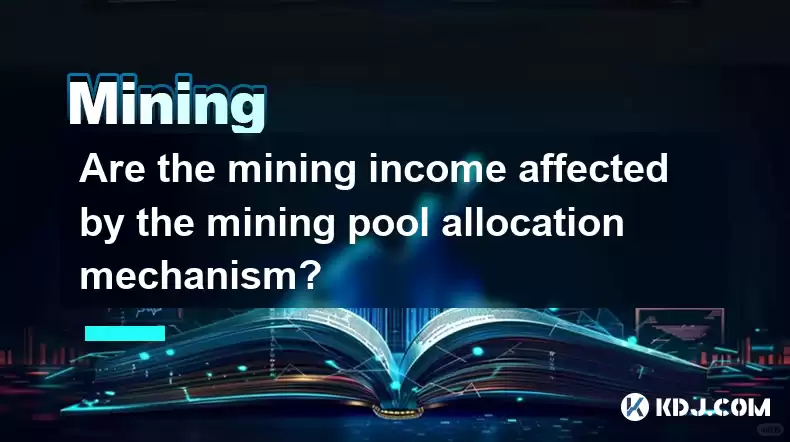-
 bitcoin
bitcoin $87959.907984 USD
1.34% -
 ethereum
ethereum $2920.497338 USD
3.04% -
 tether
tether $0.999775 USD
0.00% -
 xrp
xrp $2.237324 USD
8.12% -
 bnb
bnb $860.243768 USD
0.90% -
 solana
solana $138.089498 USD
5.43% -
 usd-coin
usd-coin $0.999807 USD
0.01% -
 tron
tron $0.272801 USD
-1.53% -
 dogecoin
dogecoin $0.150904 USD
2.96% -
 cardano
cardano $0.421635 USD
1.97% -
 hyperliquid
hyperliquid $32.152445 USD
2.23% -
 bitcoin-cash
bitcoin-cash $533.301069 USD
-1.94% -
 chainlink
chainlink $12.953417 USD
2.68% -
 unus-sed-leo
unus-sed-leo $9.535951 USD
0.73% -
 zcash
zcash $521.483386 USD
-2.87%
採礦收入受到採礦庫分配機制的影響嗎?
Mining pools use methods like PPS, PPLNS, and PROP to distribute rewards, each affecting miner income differently based on factors like network difficulty and pool fees.
2025/03/31 17:49

了解採礦池分配機制
採礦池匯總了許多礦工的哈希力量,以增加成功挖掘塊的機會。然後,根據池的參與者的貢獻將成功挖掘塊的獎勵分配在池的參與者之間 - 通常以提交的股票衡量。分配機制決定了這種分佈的發生方式。不同的池利用各種方法,每種方法都有自己的優勢和缺點。最常見的方法包括PPS(每股付款),PPLN(每股付款)和Prop(比例)。了解這些機制對於礦工估計其潛在收入至關重要。
不同的分配機制如何影響收入
PPS(每股付款):這種方法向他們提交的每個股票支付礦工,而不管游泳池是否找到一個塊。這提供了一致的收入,但是泳池運營商承擔著沒有找到障礙的風險。與由於游泳池的費用,礦工的收益略有減少。
pplns(每股付款):此方法根據礦工對最後一個“ n'股份”的貢獻支付礦工的貢獻。如果游泳池始終找到障礙,這將是更有意義的,但是如果游泳池經歷低運氣時期,它可能會導致收入波動。池之間的“ n'的值不同。
道具(比例):這是一種更簡單的方法,其中塊獎勵與每個礦工對池的總哈希功率的貢獻成比例地分佈。這很簡單,但由於池的整體採礦成功率的差異,可能比PPS更不可預測。具有較高哈希力的礦工通常會獲得更大的份額。
基於分數的系統:某些池採用更複雜的基於得分的系統,這些系統將考慮到僅僅提交的股票的考慮因素。這些可能包括礦工的正常運行時間或對游泳池整體穩定性的貢獻。這些系統的目的是進行更公平的分佈,但它們可以更複雜地理解。
超出影響採礦收入的分配機制的因素
儘管分配機制顯著影響收入分配,但其他因素也起著至關重要的作用。其中包括:
網絡難度:隨著網絡難度的增加,發現區塊的機會會減少,影響所有礦工的收入,而不論池的分配機制如何。這是超出池或單個礦工控制的外部因素。
Hashrate:礦工貢獻的哈希力量的數量直接影響其獎勵所佔的份額。不論所選分配方法如何,較高的哈希酸鹽通常轉化為較高的收入。
區塊獎勵:加密貨幣的區塊獎勵是採礦盈利能力的基本決定因素。較高的獎勵自然會導致礦工的潛在收入更高。塊獎勵的變化通常被安排為加密貨幣設計的一部分,直接影響採礦盈利能力。
池費:所有池收取費用,通常是塊獎勵的百分比。這些費用減少了礦工收到的淨收入。不同的池有不同的收費結構。選擇較低費用的游泳池可以提高整體盈利能力。
電力成本:電力採礦硬件的電力成本是礦工的主要費用。高電價顯著影響盈利能力,這一成本與池的分配機制無關。
選擇正確的採礦池:平衡的方法
選擇一個採礦池涉及考慮以外的幾個因素,而不僅僅是分配機制。礦工應分析池費用,池哈希拉特(以確保找到一致的塊找到),正常運行時間和泳池運營商的聲譽。分配機制的選擇應在這些其他因素的背景下查看。一些礦工更喜歡PPS的一致性,而另一些礦工可能會忍受PPLN的變異性,以獲得可能更高的獎勵。
常見的問題和答案
問:PPS始終是最佳分配機制嗎?答:不一定。儘管PPS提供一致的支出,但如果游泳池的運氣很高,則與其他方法相比,它可能會導致較低的總收入。減少的每股支付彌補了泳池運營商的風險。
問:不論池如何,網絡難度如何影響我的採礦收入?答:較高的網絡難度使得很難找到塊,無論分配機制如何,都會降低池中所有礦工的獎勵頻率。
問:我可以輕鬆切換採礦池嗎?答:是的,通常您可以相對輕鬆地切換池。但是,您可能需要相應地配置採礦軟件。
問:我的收入中池的作用是什麼?答:較大的池哈希酸鹽通常會增加塊發現的頻率,這可能會導致更高的總收入,但這也取決於分配方法和池的費用。
問:採礦池有任何風險嗎?答:是的,池運營商總是有不誠實行動的風險,儘管具有良好往績的知名游泳池最小化了這種風險。研究和選擇一個值得信賴的池至關重要。
問:如何在PPLN中選擇正確的'n'值?答:最佳的“ n”值取決於您的風險承受能力和池的歷史表現。更高的“ N”減少了短期波動,但可能會延遲付款。較低的“ N”提供了更快的支出,但增加了收入波動。
問:在採礦池中付款多久一次?答:付款頻率各不相同,從每天到每週支付。這通常由池的條款和條件指定。
免責聲明:info@kdj.com
所提供的資訊並非交易建議。 kDJ.com對任何基於本文提供的資訊進行的投資不承擔任何責任。加密貨幣波動性較大,建議您充分研究後謹慎投資!
如果您認為本網站使用的內容侵犯了您的版權,請立即聯絡我們(info@kdj.com),我們將及時刪除。
- Exaverse 呼嘯而至 Roguelike 場景:恐龍冒險等待著您!
- 2026-02-05 00:30:01
- 大蘋果咬:人工智能預測以太坊價格將創歷史新高,市場將在波動中航行
- 2026-02-05 01:10:02
- 釋放您的優勢:MEXC 推薦代碼、USDT 獎金和費用折扣的終極指南
- 2026-02-05 01:00:02
- 紐約一分鐘導航:2026 年全球加密貨幣交易費用一覽
- 2026-02-05 01:05:02
- 比特幣技術分析師警告稱,市場動盪可能導致價格下跌
- 2026-02-05 01:00:02
- 大蘋果緊縮:隨著區塊時間激增和難度錶盤硬重置,比特幣挖礦面臨利潤危機
- 2026-02-05 00:50:02
相關知識

如何識別雲挖礦騙局? (需要注意的危險信號)
2026-02-02 08:20:20
不切實際的回報承諾1. 平台宣傳保證每日回報高於 1-2%,但未披露底層硬件、電力成本或挖礦難度波動,這是高度可疑的。 2.“無風險利潤”或“被動收入每 30 天翻一番”的說法與工作量證明經濟學的基本原則相矛盾。 3. 忽略網絡算力增長、區塊獎勵減半和礦池費用的投資回報率計算器往往掩蓋了不可持續的支...

如何在Linux上挖掘Bitcoin? (Ubuntu 高級指南)
2026-02-03 20:59:47
設置挖礦環境1. 安裝 Ubuntu Server 22.04 LTS,並進行全盤加密和最少的軟件包選擇,以減少攻擊面並提高穩定性。 2. 更新系統存儲庫索引並使用apt update && apt update -y升級所有已安裝的軟件包,然後再繼續。 3. 安裝必要的構建工具,包...

如何建立多幣種礦場? (可擴展性提示)
2026-02-03 00:59:57
硬件選型策略1. 根據幣種特定算法兼容性選擇 ASIC 礦機 - Bitcoin 為 SHA-256,萊特幣為 Scrypt,以太坊經典和 Ravencoin 分別為 Ethash 或 KawPoW。 2. 在比較 Bitmain、MicroBT 和 Canaan 等製造商的模型時,優先考慮 J/T...

如何通過DePIN挖礦賺取被動收入? (2026新趨勢)
2026-02-01 12:40:27
了解 DePIN 挖礦機制1. DePIN挖礦依賴於現實世界的基礎設施參與,而不是計算哈希。用戶部署無線熱點、傳感器節點或邊緣計算設備等物理硬件來支持去中心化網絡。 2. 每個經過驗證的貢獻(例如信號覆蓋、數據中繼或存儲配置)都記錄在鏈上,並通過自動獎勵分配機制轉換為協議原生代幣。 3. 與傳統 P...

如何使用瀏覽器挖掘加密貨幣? (值得嗎?)
2026-02-03 21:20:09
了解基於瀏覽器的加密貨幣挖掘1. 基於瀏覽器的加密挖掘依賴於嵌入在網站中的 JavaScript 代碼來利用訪問者的 CPU 或 GPU 資源來執行計算任務。 2. 該方法使用WebAssembly和Web Workers API來執行哈希操作,無需安裝軟件。 3. 礦工在瀏覽器選項卡內運行,通常是...

如何重新粘貼您的挖礦 GPU 以降低溫度? (維護)
2026-02-03 00:00:11
了解熱界面材料的退化1. 隨著時間的推移,GPU 芯片上的導熱膏會因反復加熱和冷卻循環而變乾、破裂或從芯片表面分離。 2. 較舊的焊膏配方可能會滲出矽油,留下導電性較差的殘留物,從而起到隔熱作用,而不是傳遞熱量。 3. 礦場的高環境溫度會加速化學分解,特別是當 GPU 以 90% 以上的利用率運行數...

如何識別雲挖礦騙局? (需要注意的危險信號)
2026-02-02 08:20:20
不切實際的回報承諾1. 平台宣傳保證每日回報高於 1-2%,但未披露底層硬件、電力成本或挖礦難度波動,這是高度可疑的。 2.“無風險利潤”或“被動收入每 30 天翻一番”的說法與工作量證明經濟學的基本原則相矛盾。 3. 忽略網絡算力增長、區塊獎勵減半和礦池費用的投資回報率計算器往往掩蓋了不可持續的支...

如何在Linux上挖掘Bitcoin? (Ubuntu 高級指南)
2026-02-03 20:59:47
設置挖礦環境1. 安裝 Ubuntu Server 22.04 LTS,並進行全盤加密和最少的軟件包選擇,以減少攻擊面並提高穩定性。 2. 更新系統存儲庫索引並使用apt update && apt update -y升級所有已安裝的軟件包,然後再繼續。 3. 安裝必要的構建工具,包...

如何建立多幣種礦場? (可擴展性提示)
2026-02-03 00:59:57
硬件選型策略1. 根據幣種特定算法兼容性選擇 ASIC 礦機 - Bitcoin 為 SHA-256,萊特幣為 Scrypt,以太坊經典和 Ravencoin 分別為 Ethash 或 KawPoW。 2. 在比較 Bitmain、MicroBT 和 Canaan 等製造商的模型時,優先考慮 J/T...

如何通過DePIN挖礦賺取被動收入? (2026新趨勢)
2026-02-01 12:40:27
了解 DePIN 挖礦機制1. DePIN挖礦依賴於現實世界的基礎設施參與,而不是計算哈希。用戶部署無線熱點、傳感器節點或邊緣計算設備等物理硬件來支持去中心化網絡。 2. 每個經過驗證的貢獻(例如信號覆蓋、數據中繼或存儲配置)都記錄在鏈上,並通過自動獎勵分配機制轉換為協議原生代幣。 3. 與傳統 P...

如何使用瀏覽器挖掘加密貨幣? (值得嗎?)
2026-02-03 21:20:09
了解基於瀏覽器的加密貨幣挖掘1. 基於瀏覽器的加密挖掘依賴於嵌入在網站中的 JavaScript 代碼來利用訪問者的 CPU 或 GPU 資源來執行計算任務。 2. 該方法使用WebAssembly和Web Workers API來執行哈希操作,無需安裝軟件。 3. 礦工在瀏覽器選項卡內運行,通常是...

如何重新粘貼您的挖礦 GPU 以降低溫度? (維護)
2026-02-03 00:00:11
了解熱界面材料的退化1. 隨著時間的推移,GPU 芯片上的導熱膏會因反復加熱和冷卻循環而變乾、破裂或從芯片表面分離。 2. 較舊的焊膏配方可能會滲出矽油,留下導電性較差的殘留物,從而起到隔熱作用,而不是傳遞熱量。 3. 礦場的高環境溫度會加速化學分解,特別是當 GPU 以 90% 以上的利用率運行數...
看所有文章










































































